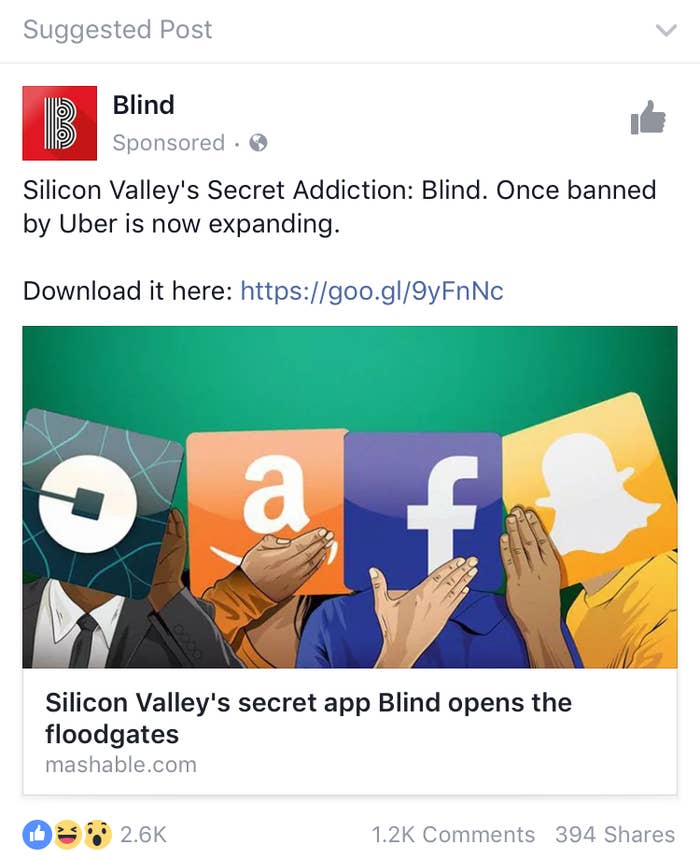
When the workplace gossip app Blind expanded its product’s availability earlier this summer, it got the word out via an age-old tactic: advertising. But instead of running a traditional ad campaign, the company took a route gaining favor among advertisers big and small: It paid Facebook to promote a favorable review of its service.
Blind spent thousands of dollars promoting a Mashable article headlined “Silicon Valley's secret app Blind opens the floodgates.” The post drove more than 11,000 visits to its app download page, according to publicly available analytics. The campaign worked out nicely for Blind — and for Facebook, a master at making money off of other people’s content. But Mashable, which sells advertising to companies like Blind, didn’t see a dime. Neither did any other traditional publisher.
For publishers scrambling to compete with Facebook for advertising dollars, Blind’s Facebook-boosting strategy highlights yet another point of struggle. And advertisers are embracing the practice, steering ad dollars to Facebook that might otherwise have gone to publishers for whom they have long been a key revenue stream. Mattress company Casper, for instance, repurposed a BBC story as a Facebook ad promoting its product; a local plumbing company in Texas used a Dallas Morning News article about a water main break to promote its service; Facebook itself recently promoted an Ad Age article to hype its video offering.
Facebook is running ads promoting AdAge articles about it.
The BBC, Ad Age, and the Dallas Morning News did not immediately respond to requests for comment. A spokesperson for the New York Times declined comment on the issue of Facebook boosting.
For advertisers looking for social media momentum, Facebook boosting is an easy way to market their products without paying someone to create an advertisement. And even better, they can convey their message with a shareable news article that doesn't appear to be an advertisement — because it isn't.
Promoting positive coverage on Facebook isn’t a particularly new strategy, but it seems to be gaining steam of late. Blind Head of US Operations Alex Shin told BuzzFeed News that a number of the startups he’s in contact with are employing the tactic, and he expects more companies to follow. “It’s probably the best form of awareness building, community building, and user acquisition there is,” he said.
“We’ve gotten calls, like, ‘Hey, we need your money, guys.’”
One advertiser that spends millions of dollars a year promoting articles on Facebook told BuzzFeed News that some media companies are so worried by the practice they’ve begun to complain. “We’ve gotten calls, like, ‘Hey, we need your money, guys,’” the advertiser said. “There’s no question these publishers have an issue. I don’t know what choice they have frankly.”
Indeed, with 2 billion users and ad targeting tools that enable advertisers to send their message to just the right demographic, Facebook is particularly alluring for advertisers who want to make sure the stories they like reach the people they most want to see them.
"You can’t just rely on the reach of a publisher who gives you a good review. You now have to take that review and promote it to 10 times or 20 times of the publisher’s audience,” Jason Stein, CEO of the ad agency Laundry Service, told BuzzFeed News. "Why wouldn’t you do that? It’s such a powerful piece of content to promote to people."
The practice could be particularly painful to publishers with native ad shops (BuzzFeed included), which create content for advertisers, since advertisers may decide they can get by on free editorial coverage, using Facebook as a delivery mechanism.
Eric Perko, head of media at the advertising agency Muhtayzik Hoffer, told BuzzFeed News these types of ad buys are particularly effective because they resonate with people scrolling through social feeds. “It’s content that people want to read and it comes from a credible source,” Perko said. “At the end of the day that results in a more impactful impression against your target audience than trying to interrupt them [with a normal ad].”
Mashable's chief strategy officer, Adam Ostrow, said he's not particularly concerned about Facebook boosting undermining Mashable's ad revenues. Ad buys like Blind’s, he told BuzzFeed News, differ from the typical, preplanned campaigns Mashable runs; they’re a relative drop in the bucket. “We’re not worried about this particular segment of the market,” Ostrow said.
Still, now that people live in social streams, and advertisers are desperate to get a toehold inside them, the practice is likely to continue to draw attention and dollars. “What advertising professionals need is more and more and more content,” Jeff Melton, chief strategy officer at marketing company A Big Agency, told BuzzFeed News. “For less money per asset, you can create more credible, more persuasive content from your PR entity versus working with your lead creative shop.”
